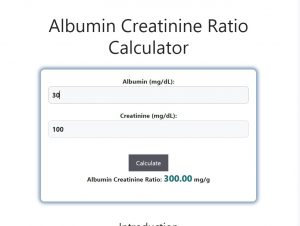Introduction
The Albumin Creatinine Ratio (ACR) is a critical measurement used in assessing kidney function. It measures the amount of albumin, a type of protein, relative to creatinine in the urine. Elevated ACR levels can indicate kidney damage or disease, which is why regular monitoring is essential, especially for people with diabetes or hypertension. Our Albumin Creatinine Ratio Calculator helps you quickly calculate this important health metric by dividing the albumin concentration by the creatinine concentration in your urine.
Formula
The formula to calculate the Albumin Creatinine Ratio (ACR) is:
Albumin Creatinine Ratio (ACR) = Albumin (mg/dL) / Creatinine (mg/dL)
This ratio helps determine if there is excess albumin in the urine, which can be a sign of kidney problems.
How to Use
- Obtain your urine test results for albumin (measured in mg/dL) and creatinine (also measured in mg/dL).
- Enter the albumin concentration into the Albumin Creatinine Ratio Calculator.
- Enter the creatinine concentration into the calculator.
- Click the “Calculate” button to find your ACR.
This calculator provides a quick and accurate way to assess kidney function based on your urine test results.
Example
Let’s say your urine test results show an albumin concentration of 30 mg/dL and a creatinine concentration of 100 mg/dL. Using the formula:
ACR = 30 mg/dL / 100 mg/dL = 300
An ACR of 0.3 indicates a normal range, but higher values may suggest the need for further medical evaluation.

FAQs
- What is the Albumin Creatinine Ratio (ACR)? The Albumin Creatinine Ratio (ACR) is a measure used to assess kidney function by comparing the levels of albumin and creatinine in urine.
- Why is ACR important for kidney health? Elevated ACR levels can indicate early signs of kidney damage, especially in individuals with conditions like diabetes or high blood pressure.
- How do I calculate ACR? You can calculate ACR using the formula: ACR = Albumin (mg/dL) / Creatinine (mg/dL).
- What is a normal ACR level? A normal ACR level is generally less than 30 mg/g. Higher levels may indicate kidney damage and should be further evaluated by a healthcare provider.
- What does a high ACR mean? A high ACR suggests that there may be excess protein in the urine, which is a potential indicator of kidney disease.
- Can ACR be used to monitor chronic kidney disease (CKD)? Yes, ACR is a useful tool for monitoring the progression of chronic kidney disease and assessing the effectiveness of treatments.
- How often should I check my ACR? People at risk for kidney disease, such as those with diabetes or hypertension, should check their ACR regularly as advised by their healthcare provider.
- What factors can affect ACR levels? Factors like dehydration, urinary tract infections, and intense physical activity can temporarily affect ACR levels.
- How is ACR different from glomerular filtration rate (GFR)? ACR measures protein levels in the urine, while GFR assesses how well the kidneys are filtering blood. Both are important for assessing kidney function.
- Can medications influence ACR results? Yes, certain medications, such as NSAIDs or ACE inhibitors, can influence ACR levels, so it’s important to inform your healthcare provider about any medications you are taking.
- What is microalbuminuria? Microalbuminuria is a condition where small amounts of albumin are present in the urine, indicating early kidney damage. An ACR of 30-300 mg/g is typically considered microalbuminuria.
- What is macroalbuminuria? Macroalbuminuria is a more severe condition where large amounts of albumin are found in the urine, typically indicating more advanced kidney damage. An ACR above 300 mg/g is considered macroalbuminuria.
- How can I lower my ACR? Lowering your ACR involves managing underlying conditions like diabetes and hypertension, maintaining a healthy diet, and following your healthcare provider’s advice on medications and lifestyle changes.
- Is fasting required for an ACR test? No, fasting is not required for an ACR test. It is usually performed on a random urine sample or a 24-hour urine collection.
- Can ACR tests be done at home? While some home kits may allow for urine collection, ACR tests are typically performed by a healthcare provider in a lab setting for accurate results.
- What is the significance of albumin in urine? Albumin is a protein that should generally remain in the bloodstream. Its presence in urine suggests that the kidneys may not be functioning properly.
- What should I do if my ACR is high? If your ACR is high, consult your healthcare provider for further evaluation and potential treatment to protect your kidney health.
- How is ACR related to diabetes? People with diabetes are at higher risk of developing kidney disease, and regular ACR monitoring can help detect early signs of kidney damage.
- What is the relationship between ACR and blood pressure? High blood pressure can damage the kidneys over time, leading to elevated ACR levels. Controlling blood pressure is key to preventing kidney damage.
- Is ACR used for both men and women? Yes, ACR is used to assess kidney function in both men and women, although normal values may vary slightly between sexes.
Conclusion
The Albumin Creatinine Ratio (ACR) is a vital measurement for assessing kidney health, especially for individuals at risk of kidney disease. By calculating your ACR, you can detect early signs of kidney damage and take proactive steps to manage your health. Our Albumin Creatinine Ratio Calculator simplifies this process, allowing you to monitor your kidney function and consult with your healthcare provider as needed. Regular ACR testing is an important part of maintaining overall health and preventing serious kidney-related complications.
Related:
